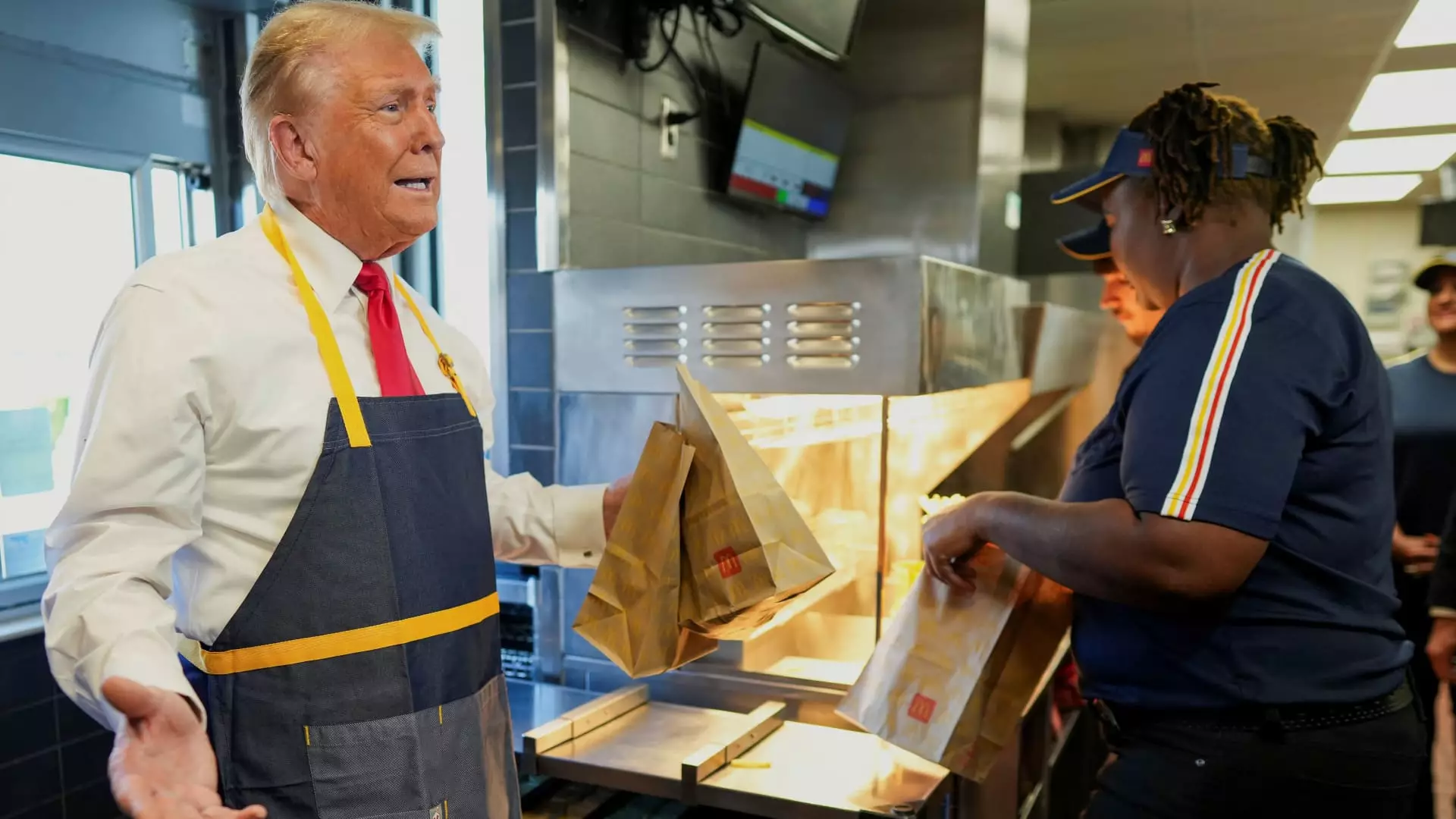In an era where fast-food restaurants are often intertwined with political sentiments, McDonald’s stands at a crossroads. Recently, former President Donald Trump’s visit to a Pennsylvania location, where he engaged in a brief stint at the fryer and drive-thru, has reignited the brand’s association with political discourse. Despite the stir surrounding this visit, McDonald’s is keen on maintaining its stance as an apolitical entity. The company’s internal communication, seen by CNBC, clarifies its position: “McDonald’s does not endorse candidates for elected office,” affirming their commitment to neutrality, particularly in an election year that promises to be divisive.
Trump’s foray into the fast-food world was not merely an ordinary visit. Using the venue as a platform to critique his political opponent, Vice President Kamala Harris, he amplified his claims regarding her past employment at McDonald’s. Trump has accused Harris of fabricating her experiences, casting doubt without presenting any substantiated evidence. This contentious exchange resonates through the political arena, with Harris firmly denying Trump’s allegations. The discourse surrounding their conflicting narratives raises the question of how businesses like McDonald’s, with vast consumer bases, navigate the personal and professional entanglements of political figures.
In light of the current political climate, McDonald’s franchisees have been outspoken about their commitment to inclusivity. Derek Giacomantonio, the franchise owner of the Feasterville location, publicly emphasized his dedication to supporting an open and welcoming environment for all customers. By agreeing to host Trump’s visit, Giacomantonio signified that he embraces the diversity of opinions within the community. McDonald’s broader messaging reinforces this point, stating that their brand is a fixture in American lives, accessible and relatable to every demographic. However, this raises questions about the genuine impact of such inclusivity versus the potential for alienation amid heightened political tensions.
The Economic Landscape and Corporate Response
While McDonald’s attempts to sidestep political controversy, the fast-food chain has not escaped scrutiny regarding pricing policies amid inflationary pressures. Following concerns about soaring menu prices, Republicans have attempted to link McDonald’s cost increases to the current administration’s economic policies. This has potentially serious implications for the brand’s reputation and sales, as consumers grapple with economic challenges. It highlights a growing trend where corporations can become lightning rods for political discontent, often caught in a crossfire they did not invite. In response to the public outcry, McDonald’s U.S. President Joe Erlinger proactively addressed consumer grievances by releasing a letter defending the company’s pricing structure—an attempt to clarify and appease tensions amid rising costs.
The shifting dynamics of American corporations illustrate a growing reluctance to engage with political issues, reflecting a societal desire for businesses to remain neutral. A recent Gallup study indicates that a significant portion of the American populace—62%—believes companies should avoid taking public stances on political matters. This sentiment stands in stark contrast to prior business practices, such as McDonald’s public endorsement of the Black Lives Matter movement in 2020. The current trend indicates that brands are reconsidering how they position themselves in an increasingly polarized environment, with many opting to refrain from ideological engagement to retain consumer loyalty across the political spectrum.
As McDonald’s navigates this complex terrain, the challenge remains: how to remain a beloved American institution while avoiding the pitfalls of political allegiances. The company’s decision to highlight its long-standing association with both Trump and Harris underscores the delicate balance it must strike between being a community fixture and a corporate entity. Moving forward, it will be interesting to observe whether McDonald’s can continue to embody the inclusive, accessible brand they aspire to be, without becoming mired in the contentious politics that surround it. The evolving landscape of American consumer behavior may dictate the future focus of fast-food chains, pushing them toward a more calculated and careful approach in their public engagements.


Leave a Reply